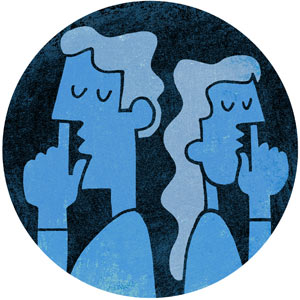Breaking Bad Habits
| Dan Bolton 01/24/2013 |

As we continue to discuss negativity, it is important to keep in mind that if you decide to make changes in your life, that change is not an easy process. In fact your brain resists changing... Multiple different theories in psychology and neuroscience have identified the brain as seeking the familiar, the status quo, the path of least resistance; essentially the human tendency is to gravitate toward whatever baseline you have established in your life. This is a tendency that you have to be motivated to, and be ready to exert willpower to overcome.
The good news is that the brain is built to change in response to experience. "We knew that neurons can change their firing patterns when habits are learned, but it is startling to find that these patterns reverse when the habit is lost, only to recur again as soon as something kicks off the habit again," said Graybiel, who is also the Walter A. Rosenblith Professor of Neuroscience in MIT's Department of Brain and Cognitive Sciences (BCS). It is possible to create a new baseline. Research has shown that it takes 30 days for the brain to make new synaptic connections that are better resistant to regression from change. That means if you want to change the habits you have now and truly replace them with new ones, you have to maintain your new target baseline for 30 days.
The most difficult part will be the first few days as your body and mind are living out of their comfort zone. For example, if you make it your goal to start going to the gym, the first couple of trips are going to be the hardest. You will feel pain, your muscles will ache, you will feel tired. The initial pain and exhaustion will make you want to discontinue. If you can push through this resistance, after the second or third workout you will start to feel post workout highs, and then you will not want to wait to get back into the gym. Some people have called this positive addiction. Another example would be dedicating time to go out and do something social after work if you tend to go home and veg out to evening television. At the end of the work day your mind will push you to do what it is used to doing, go back home, and crash on the couch. It will feel awkward and possibly uncomfortable to be out. In fact, you might feel cranky and have all sorts of grumpy Grinch-like thoughts about what a pain in the ass it is to be out. The conundrum is that if you succumb to that pressure you will feel the same sense of dissatisfaction that motivated you to want to make the change in the first place. After you're out a few times you will begin to enjoy yourself. But remember, if you don't keep up with the new routine for 30 days, it won't stick, and you'll be back at square one.
What new habits are you going to devote yourself to?
References:
Sigmund Freud, Introductory Lectures 16.357.
The Standard Edition of the Complete Psychological Works of Sigmund Freud, Volume XVIII (1920-1922): Beyond the Pleasure Principle
Graybiel, AM. "Habits, rituals and the evaluative brain." Annu Rev Neurosci. 2008;31:359-87.
http://web.mit.edu/newsoffice/2005/habit.html
